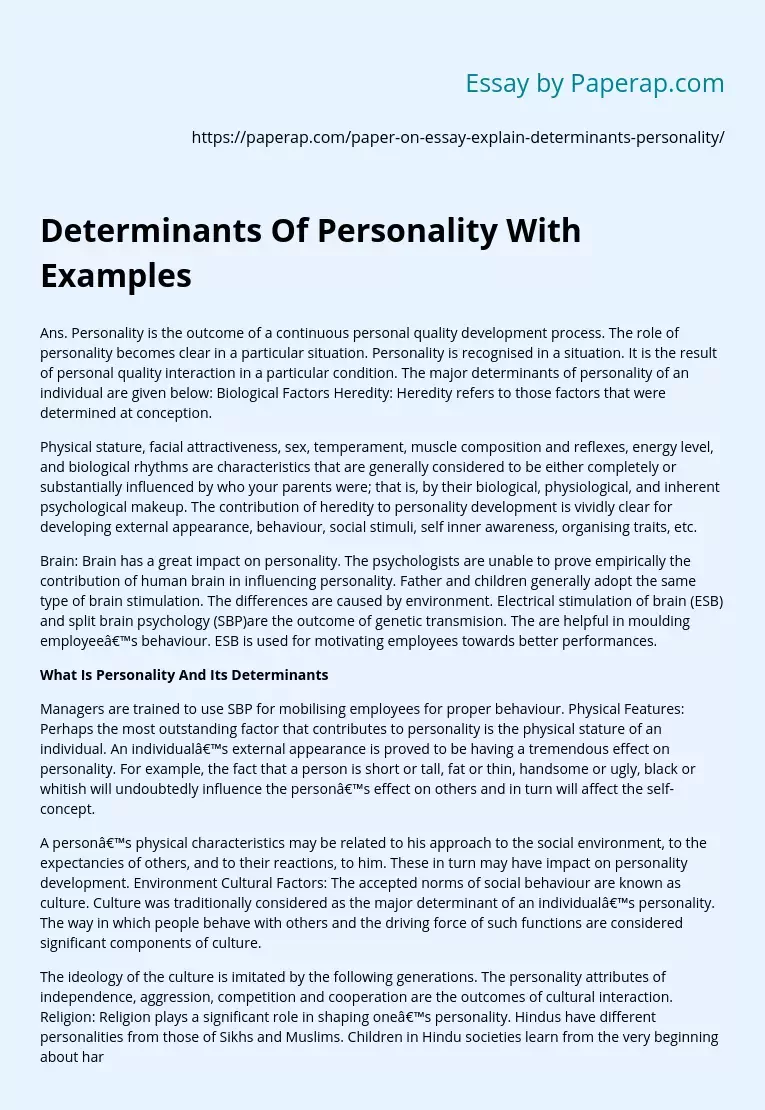Determinants Of Personality With Examples
Ans. Personality is the outcome of a continuous personal quality development process. The role of personality becomes clear in a particular situation. Personality is recognised in a situation. It is the result of personal quality interaction in a particular condition. The major determinants of personality of an individual are given below: Biological Factors Heredity: Heredity refers to those factors that were determined at conception.
Physical stature, facial attractiveness, sex, temperament, muscle composition and reflexes, energy level, and biological rhythms are characteristics that are generally considered to be either completely or substantially influenced by who your parents were; that is, by their biological, physiological, and inherent psychological makeup.
The contribution of heredity to personality development is vividly clear for developing external appearance, behaviour, social stimuli, self inner awareness, organising traits, etc.
Brain: Brain has a great impact on personality. The psychologists are unable to prove empirically the contribution of human brain in influencing personality. Father and children generally adopt the same type of brain stimulation.
The differences are caused by environment. Electrical stimulation of brain (ESB) and split brain psychology (SBP)are the outcome of genetic transmision. The are helpful in moulding employee’s behaviour. ESB is used for motivating employees towards better performances.
What Is Personality And Its Determinants
Managers are trained to use SBP for mobilising employees for proper behaviour. Physical Features: Perhaps the most outstanding factor that contributes to personality is the physical stature of an individual. An individual’s external appearance is proved to be having a tremendous effect on personality.
For example, the fact that a person is short or tall, fat or thin, handsome or ugly, black or whitish will undoubtedly influence the person’s effect on others and in turn will affect the self-concept.
A person’s physical characteristics may be related to his approach to the social environment, to the expectancies of others, and to their reactions, to him. These in turn may have impact on personality development. Environment Cultural Factors: The accepted norms of social behaviour are known as culture. Culture was traditionally considered as the major determinant of an individual’s personality. The way in which people behave with others and the driving force of such functions are considered significant components of culture.
The ideology of the culture is imitated by the following generations. The personality attributes of independence, aggression, competition and cooperation are the outcomes of cultural interaction. Religion: Religion plays a significant role in shaping one’s personality. Hindus have different personalities from those of Sikhs and Muslims. Children in Hindu societies learn from the very beginning about hard work and god-fearing attitudes. Christians are open, independent, and cooperative. Family: Children learn from their parents, sisters and brothers. amily is the first factor affecting personality development, after hereditary characteristics are endowed. Rich people have different personalities from those of poor. Children nurtured under a warm, loving environment are positive and active as compared to children neglected by their parents. Parental Influences: The positive and negative personalities of children are dependent on their parents characteristics and mutual behaviour. Children develop negative personalities if their parents don’t have good relationship. Proper parental guidance to children makes them active and efficient.
Situation Situation further influences the effects of heredity and environment on personality. A individual’s personality, while generally stable and consistent, does change in different situations. Different demands in different situations call forth different aspects of one’s personality. It has been observed that many arrogant and indisciplined employees become humble and disciplined in a particular situation. Those having a criminal background may become powerful and strong administrators, dominant politicians, etc.
Determinants Of Personality With Examples. (2019, Dec 05). Retrieved from https://paperap.com/paper-on-essay-explain-determinants-personality/

